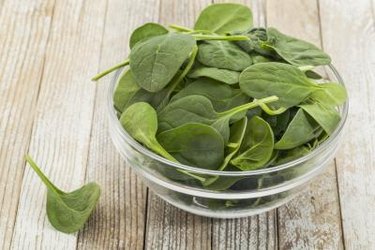
Spinach has a place on the table for every meal. You can enjoy breakfast omelets stuffed with spinach, sandwiches topped with fresh spinach instead of lettuce and creamed spinach as an accompaniment to a steak dinner. You may be surprised to find, though, that frozen spinach compares favorably with fresh spinach in some nutritional regards. Make the most of healthful spinach by enjoying it fresh or after it has been frozen.
Nutrition
Video of the Day
In a study published in the "Journal of the Science of Food and Agriculture" in 2007, University of California, Davis, researchers reviewed the variable nutrient content of fresh, frozen and canned vegetables and fruits. According to their findings, "freshly picked vegetables consistently contained the greatest amounts of ascorbic acid in all vegetables studied." However, the authors found that spinach stored at room temperature lost 100 percent of its ascorbic acid in less than four days. Frozen spinach goes through a flash-freezing process that preserves it within hours after it leaves the soil, so it retains more of its vitamin C content than fresh spinach. Both forms of spinach retain their high vitamin A content well.
Video of the Day
Convenience
If you're a sporadic vegetable eater or if you dine out often, you may shop for fresh vegetables only infrequently to avoid spoilage in your refrigerator. With frozen vegetables, you always have access to a healthful side dish with your meals within a few minutes. On the other hand, if you regularly cook at home, you may prefer the convenience of fresh spinach that doesn't require thawing before it's ready to eat.
Taste
Even the most healthful food does little for you if you find it unpalatable. Depending on your tastes, you might prefer frozen spinach that has been thawed for its softer texture or fresh spinach for its crispness. Choosing the spinach you prefer to eat makes you more likely to add it to your plate. No matter how much vitamin C frozen spinach retains, if you don't enjoy eating it enough to finish your serving, you're getting less of the nutrient than you would from a fresh spinach salad that you consume completely.
Utility
Although you can use fresh spinach in almost any recipe that calls for frozen spinach, the reverse is not always true. Only fresh spinach will suffice for raw preparations such as salads and sandwich toppings. In recipes that require cooking, compact frozen spinach may be easier to handle than fresh spinach leaves that cook down significantly. If you cook regularly, having both types of spinach on hand allows you to choose which form you prefer for a given dish.
- "Journal of the Science of Food and Agriculture"; Review - Nutritional Comparison of Fresh, Frozen and Canned Fruits and Vegetables; Joy C. Rickman, et al.; 2007
- "New York Daily News"; Frozen Vegetables More Nutritious than Fresh, Study Says; Rosemary Black; March 2010
- Centers for Disease Control and Prevention: Spinach